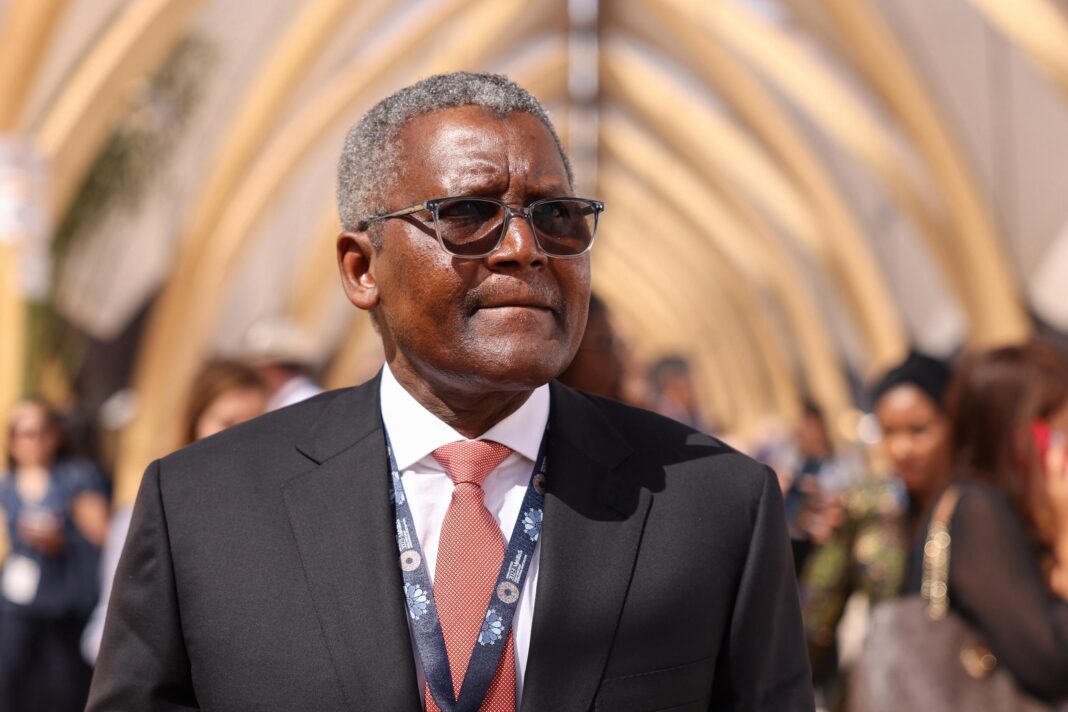A fresh wave of industrial unrest has swept through Nigeria’s energy sector as the Petroleum and Natural Gas Senior Staff Association of Nigeria, PENGASSAN, directed its members to halt gas supply to the Dangote Petroleum Refinery. The move, announced on Friday morning, marks a major escalation in an already tense standoff between the powerful oil union and Africa’s largest refinery, over allegations of mass dismissals and union suppression.
The union’s directive, signed by its General Secretary, Lumumba Okugbawa, ordered branch chairmen across major oil and gas firms including Chevron, Shell Nigeria Gas, TotalEnergies, Seplat, Oando, and Renaissance to stop crude oil and gas supply to the Dangote Refinery. The instruction, sent out as an emergency circular, also called for suspension of all loading operations of vessels bound for the refinery. PENGASSAN accused Dangote management of what it described as “illegitimate sackings” and attempts to silence workers who had expressed interest in joining the union.
The crisis reportedly began after Dangote Refinery dismissed hundreds of Nigerian workers in what management termed an internal restructuring aimed at improving efficiency and curbing operational risks. The union, however, claims that nearly 800 workers were laid off in retaliation for their decision to organize under PENGASSAN. The refinery insists the layoffs were based purely on performance and operational needs, not union activity.
By ordering a gas cut, PENGASSAN has effectively placed one of the country’s most strategic energy assets under pressure. The Dangote Refinery relies heavily on gas for key refining processes, including heating and power generation. Analysts warn that cutting off gas supply could disrupt production schedules, force temporary shutdowns, and spark ripple effects across the downstream petroleum market. The refinery, with an installed capacity of 650,000 barrels per day, has been projected as a vital component of Nigeria’s quest for self-sufficiency in fuel production.
This industrial showdown could therefore have far-reaching consequences. Any disruption in the refinery’s output may affect the already fragile supply of petrol and diesel across Nigeria, potentially driving up prices and intensifying scarcity in some regions. The timing is particularly sensitive, coming just days after the refinery announced that it would suspend petrol sales in naira due to crude supply shortages.
PENGASSAN, in its directive, described the refinery’s actions as “provocative and anti-labour” and warned that failure to comply with its shutdown order would attract disciplinary measures within the union. It also urged its members in government agencies, including the Nigerian Gas Infrastructure Company, to ensure that no gas is delivered to the facility until further notice. The union stated that its decision followed Dangote’s refusal to reinstate sacked workers or engage in constructive dialogue despite several appeals from labour leaders.
For many observers, this confrontation represents a larger struggle within Nigeria’s oil and gas sector over workers’ rights, management control, and the role of unions in newly privatized and high-profile projects. While PENGASSAN has historically fought to protect the interests of senior staff, critics argue that its approach in this case risks undermining a key national project at a time when Nigeria is struggling to stabilize fuel prices and boost domestic refining.
Economic analysts have warned that halting gas supply to such a massive facility could lead to unintended consequences for both sides. Dangote’s refinery is deeply integrated into the nation’s energy ecosystem, with crude supply chains, gas pipelines, and distribution networks all interlinked. A prolonged shutdown could reduce government revenue, create supply shocks, and harm thousands of ancillary jobs tied to refinery operations.
The federal government has not yet issued an official response, though sources within the Ministry of Labour indicated that urgent intervention talks may be convened to avert a full-scale shutdown. Industry experts expect the Nigerian National Petroleum Company Limited to step in, given its strategic partnership in crude supply arrangements with the refinery.
Meanwhile, public reaction has been sharply divided. Some Nigerians view the union’s action as a necessary stand for workers’ rights, especially amid rising reports of poor labour practices in private refineries. Others argue that such confrontational tactics could erode investor confidence and slow down progress in the energy sector.
For Aliko Dangote, the billionaire founder of the refinery, this standoff poses one of the most serious challenges since operations began. The facility, hailed as a transformative project for Nigeria’s economy, now faces operational uncertainty just as it began to ramp up fuel production. Whether through government mediation or direct negotiation, both sides will need to find a middle ground to prevent wider fallout.
As things stand, the situation remains fluid. PENGASSAN’s members have been instructed to monitor compliance, while the refinery continues its efforts to maintain operations. The coming days will be crucial in determining whether dialogue or escalation defines the next phase of Nigeria’s most significant labour dispute in years.
Samuel Aina

